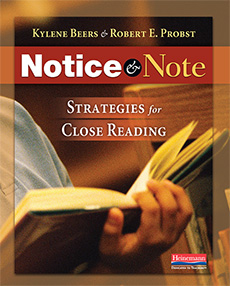
Part II of Ideas on NOTICE AND NOTE--See previous post, "Contrasts/Contradictions and Aha Moments" for more!
This post is to describe the continued the immersion of literary signposts from Kylene Beers and Robert Probst's book, Notice and Note: Strategies for Close Reading.
Remember, our goal is for our students to understand that these are not just something fun, but are tools designed to help them as they read closely, relating to and learning from the literature we read. This makes us socially smarter and our reading (and viewing) lives enriched.
We started with "Contrasts and Contradictions" then moved on through "Aha Moments", as described in an earlier post.
Over recent days, we have moved through "Tough Questions". Again, we created a class anchor chart for each of these signposts as the children followed along, creating their own in their readers' notebooks. We drew a sign (like a street sign) with the name of the signpost, added the types of clues that the reader will encounter, a STOP sign for what the reader needs to do and a speech balloon with a large-print question on it to draw attention to what the reader should wonder when encountering this signpost. Finally, we added what the reader can expect to learn from using this signpost.
We decided to introduce each signpost by using video clips from movies made from literary texts.
For "Tough Questions" we used:
Ø Blowin’ in the Wind (song plus the book)
Ø Scrooge's "Tough Questions" for
Spirit #3 (Ghost of Christmas Yet to Come)
and considered (but ended up not needing)…
Ø Abraham, Martin, and John
Ø Sarah, Plain and Tall (first minute of clip)
We continued to use the following texts (having students re-read, notice, and note the "Tough Questions":
Each Kindness by Jacqueline Woodson
and the short story of "The New Kid" from Scholastic's Read-Aloud Anthology
In closer examination of how tough questions are posed in a text, we examined Caleb's questions in Sarah, Plain and Tall by Patricia MacLachlan.
We noted that there were times that he (and Papa) asked questions that weren't phrased as questions and we also practiced trying out how that might sound if we did it. (This really helped.)
Next, we revisited Kate DiCamillo's Because of Winn-Dixie, considering the scene during which Opal coaxes the preacher to tell her ten things about her mother. The children detected nuanced questions, including when Opal stated, "Just like me," and the preacher confirmed it as well as when he skipped number nine, requiring a reminder.
The kids caught on to Opal's "tough question" (not worded as a question) from Opal when the preacher told her that her mother loved her very much. Opal responds, "But she left me." The students brought up that she said this because it was really questioning WHY her mother left her if she loved her so much.
And a great inference came from a student who said, "I think he skipped number 9 on purpose, since it must have been really hard for him to say. This deeply and beautifully added to the conversation about WHY Opal's mother might have left her.
The children found other non-questions that were "tough questions," recognizing that even when Opal told the preacher how many things he had told her or which number he was ready to tell, she was really asking or prodding him for more.
Finally, they realized that Opal's writing the list of ten things about her mother as soon as she got back to her room was done as part of asking herself if she would recognize her mother if she ever saw her again and wondering if she could, would her mother stay?
What a beautiful, melancholy conversation we had about this text--one of my favorites--loaded with tough questions that almost go unasked.
'
COMING SOON: "Words of the Wiser"
Hmmm...I like the idea of literary signposts. I'll have to check this out, if not for my kiddos, then maybe just for me. ;)
ReplyDeleteI've been wanting to read NOTICE AND NOTE. Thanks for sharing how you have used it with your students. Now I'm even more eager to read it.
ReplyDelete